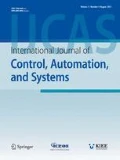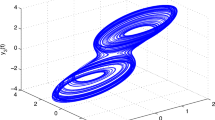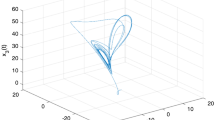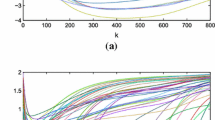Abstract
In this paper, we deal with the exponential pinning synchronization (PS) of stochastic T-S fuzzy delayed complex dynamical networks (FDCDNs) with heterogeneous impulsive delays. Unlike the existing works, a fuzzy memory pinning impulsive control (FMPIC) approach is proposed. In order to conquer the difficulties of studying such general system, sufficient conditions that depend on the discrete-delay and distributed-delay impulsive effects are obtained by employing the Lyapunov function, inequality techniques and stochastic analysis theory. It is shown that the PS of FDCDNs can be achieved under the designed FMPIC. Numerical simulation on basis of BA scale-free coupled network is used to illustrate the effectiveness of the theoretical results.
Similar content being viewed by others
References
V. Makarov, S. Kundu, D. Kirsanov, N. Frolov, V. Maksimenko, D. Ghosh, and A. Hramov, “Multiscale interaction promotes chimera states in complex networks,” Communications in Nonlinear Science and Numerical Simulation, vol. 71, pp. 118–129, June 2019.
Y. Xia, “A new neural network for solving linear programming problems and its application,” IEEE Transactions on Neural Networks, vol. 7, no. 2, pp. 525–529, March 1996.
R. Zhang, D. Zeng, S. Zhong, K. Shi, and J. Cui, “New approach on designing stochastic sampled-data controller for exponential synchronization of chaotic Lur’e systems,” Nonlinear Analysis: Hybrid Systems, vol. 29, pp. 303–321, August 2018.
J. Xiao, S. Wen, X. Yang, and S. Zhong, “New approach to global Mittag-Leffler synchronization problem of fractionalorder quaternion-valued BAM neural networks based on a new inequality,” Neural Networks, vol. 122, pp. 320–337, 2020.
P. Selvaraj, R. Sakthivel, and C. K. Ahn, “Observer-based synchronization of complex dynamical networks under actuator saturation and probabilistic faults,” IEEE Transactions on Systems, Man, and Cybernetics: Systems, vol. 49, no. 7, pp. 1516–1526, July 2018.
R. Zhang, D. Zeng, J. H. Park, Y. Liu, and S. Zhong, “Quantized sampled-data control for synchronization of inertial neural networks with heterogeneous time-varying delays,” IEEE Transactions on Neural Networks and Learning Systems, vol. 29, no. 12, pp. 6385–6395, December 2018.
Y. Shi, J. Cao, and G. Chen, “Exponential stability of complex-valued memristor-based neural networks with time-varying delays,” Applied Mathematics and Computation, vol. 313, pp. 222–234, November 2017.
T. Hu, Z. He, X. Zhang, and S. Zhong, “Global synchronization of time-invariant uncertainty fractional-order neural networks with time delay,” Neurocomputing, vol. 339, pp. 45–58, April 2019.
X. Wang, J. H. Park, S. Zhong, and H. Yang, “A switched operation approach to sampled-data control stabilization of fuzzy memristive neural networks with time-varying delay,” IEEE Transactions on Neural Networks and Learning Systems, vol. 31, no. 3, pp. 891–900, 2020.
L. Li, R. Xu, and J. Lin, “Mean-square stability in lagrange sense for stochastic memristive neural networks with leakage delay,” International Journal of Control, Automation and Systems, vol. 17, no. 8, pp. 2145–2158, May 2019.
J. Luo, W. Tian, S. Zhong, K. Shi, and W. Wang, “Nonfragile asynchronous event-triggered control for uncertain delayed switched neural networks,” Nonlinear Analysis: Hybrid Systems, vol. 29, pp. 54–73, August 2018.
W. Xie, H. Zhu, J. Cheng, S. Zhong, and K. Shi, “Finitetime asynchronous H∞ resilient filtering for switched delayed neural networks with memory unideal measurements,” Information Sciences, vol. 487, pp. 156–175, 2019.
N. Ozcan, M. S. Ali, J. Yogambigai, Q. Zhu, and S. Arik, “Robust synchronization of uncertain Markovian jump complex dynamical networks with time-varying delays and reaction-diffusion terms via sampled-data control,” Journal of the Franklin Institute, vol. 355, no. 3, pp. 1192–1216, February 2018.
M. S. Ali and J. Yogambigai, “Extended dissipative synchronization of complex dynamical networks with additive time-varying delay and discrete-time information,” Journal of Computational and Applied Mathematics, vol. 348, pp. 328–341, March 2019.
Y. Shan, K. She, S. Zhong, J. Cheng, W. Wang, and C. Zhao, “Event-triggered passive control for Markovian jump discrete-time systems with incomplete transition probability and unreliable channels,” Journal of the Franklin Institute, vol. 356, no. 15, pp. 8093–8117, October 2019.
X. Yang, D. W. Ho, J. Lu, and Q. Song, “Finite-time cluster synchronization of T-S fuzzy complex networks with discontinuous subsystems and random coupling delays,” IEEE Transactions on Fuzzy Systems, vol. 23, no. 6, pp. 2302–2316, December 2015.
E. Yucel, M. S. Ali, N. Gunasekaran, and S. Arik, “Sampleddata filtering of Takagi-Sugeno fuzzy neural networks with interval time-varying delays,” Fuzzy Sets and Systems, vol. 316, pp. 69–81, June 2017.
R. Rakkiyappan, A. Chandrasekar, and S. Lakshmanan, “Stochastic sampled data robust stabilisation of TS fuzzy neutral systems with randomly occurring uncertainties and time-varying delays,” International Journal of Systems Science, vol. 47, no. 10, pp. 2247–2263, November 2016.
X. Wang, J. H. Park, G. Zhao, and S. Zhong, “An improved fuzzy sampled-data control to stabilization of T-S fuzzy systems with state delays,” IEEE Transactions on Cybernetics, 2019. DOI: 10.1109/TCYB.2019.2910520
K. Shi, J. Wang, Y. Tang, and S. Zhong, “Reliable asynchronous sampled-data filtering of T-S fuzzy uncertain delayed neural networks with stochastic switched topologies,” Fuzzy Sets and Systems, vol. 381, pp. 1–25, 2020.
R. Saravanakumar, M. S. Ali, H. Huang, J. Cao, and Y. H. Joo, “Robust H∞ state-feedback control for nonlinear uncertain systems with mixed time-varying delays,” International Journal of Control, Automation and Systems, vol. 16, no. 1, pp. 225–233, March 2018.
X. Yang, J. Cao, and J. Lu, “Synchronization of delayed complex dynamical networks with impulsive and stochastic effects,” Nonlinear Analysis: Real World Applications, vol. 12, no. 4, pp. 2252–2266, August 2011.
W. Xie, H. Zhu, S. Zhong, D. Zhang, K. Shi, and J. Cheng, “Extended dissipative estimator design for uncertain switched delayed neural networks via a novel triple integral inequality,” Applied Mathematics and Computation, vol. 335, pp. 82–102, October 2018.
Y. Feng, “Fuzzy stochastic differential systems,” Fuzzy Sets and Systems, vol. 115, no. 3, pp. 351–363, November 2000.
R. Sakthivel, T. Saravanakumar, Y. K. Ma, and S. M. Anthoni, “Finit-time resilient reliable sampled-data control for fuzzy systems with randomly occurring uncertainties,” Fuzzy Sets and Systems, vol. 329, pp. 1–18, 2017.
Y. Tang, J. A. Fang, M. Xia, and X. Gu, “Synchronization of Takagi-Sugeno fuzzy stochastic discrete-time complex networks with mixed time-varying delays,” Applied Mathematical Modelling, vol. 34, no. 4, pp. 843–855, April 2010.
M. Syed Ali, M. Usha, J. Cao, and G. Lu, “Synchronisation analysis for stochastic T-S fuzzy complex networks with coupling delay,” International Journal of Systems Science, vol. 50, no. 3, pp. 585–598, January 2019.
H. Yang, L. Shu, X. Wang, and S. Zhong, “Synchronization of IT2 stochastic fuzzy complex dynamical networks with time-varying delay via fuzzy pinning control,” Journal of the Franklin Institute, vol. 356, no. 3, pp. 1484–1501, February 2019.
X. Wang, J. H. Park, K. She, S. Zhong, and L. Shi, “Stabilization of chaotic systems with T-S fuzzy model and nonuniform sampling: a switched fuzzy control approach,” IEEE Transactions on Fuzzy Systems, vol. 27, no. 6, pp. 1263–1271, June 2019.
Z. Yang and D. Xu, “Stability analysis and design of impulsive control systems with time delay,” IEEE Transactions on Automatic Control, vol. 52, no. 8, pp. 1448–1454, 2007.
X. Yang and Z. Yang, “Synchronization of T-S fuzzy complex dynamical networks with time-varying impulsive delays and stochastic effects,” Fuzzy Sets and Systems, vol. 235, pp. 25–43, January 2014.
Z. Wu, D. Liu, and Q. Ye, “Pinning impulsive synchronization of complex-variable dynamical network,” Communications in Nonlinear Science and Numerical Simulation, vol. 20, no. 1, pp. 273–280, January 2015.
W. He, F. Qian, and J. Cao, “Pinning-controlled synchronization of delayed neural networks with distributed-delay coupling via impulsive control,” Neural Networks, vol. 85, pp. 1–9, January 2017.
X. Wang, X. Liu, K. She, and S. Zhong, “Pinning impulsive synchronization of complex dynamical networks with various time-varying delay sizes,” Nonlinear Analysis: Hybrid Systems, vol. 26, pp. 307–318, November 2017.
X. Lu, X. Zhang, and Q. Liu, “Finite-time synchronization of nonlinear complex dynamical networks on time scales via pinning impulsive control,” Neurocomputing, vol. 275, pp. 2104–2110, January 2018.
Z. Wu, G. Chen, and X. Fu, “Outer synchronization of drive-response dynamical networks via adaptive impulsive pinning control,” Journal of the Franklin Institute, vol. 352, no. 10, pp. 4297–4308, October 2015.
Q. Fu, J. Cai, S. Zhong, and Y. Yu, “Pinning impulsive synchronization of stochastic memristor-based neural networks with time-varying delays,” International Journal of Control, Automation and Systems, vol. 17, no. 1, pp. 243–252, January 2019.
X. Liu, K. Zhang, and W. C. Xie, “Stabilization of timedelay neural networks via delayed pinning impulses,” Chaos, Solitons & Fractals, vol. 93, pp. 223–234, 2016.
H. Yang, X. Wang, S. Zhong, and L. Shu, “Synchronization of nonlinear complex dynamical systems via delayed impulsive distributed control,” Applied Mathematics and Computation, vol. 320, pp. 75–85, March 2018.
X. Wang, X. Liu, K. She, S. Zhong, and L. Shi, “Delaydependent impulsive distributed synchronization of stochastic complex dynamical networks with time-varying delays,” IEEE Transactions on Systems, Man, and Cybernetics: Systems, vol. 49, no. 7, pp. 1496–1504, July 2019.
W. Hu and Q. Zhu, “Stability criteria for impulsive stochastic functional differential systems with distributeddelay dependent impulsive effects,” IEEE Transactions on Systems, Man, and Cybernetics: Systems, 2019. DOI: 10.1109/TSMC.2019.2905007
X. Liu, K. Zhang, “Stabilization of nonlinear time-delay systems: Distributed-delay dependent impulsive control,” Systems & Control Letters, vol. 120, pp. 17–22, 2018.
Author information
Authors and Affiliations
Corresponding author
Additional information
Publisher’s Note Springer Nature remains neutral with regard to jurisdictional claims in published maps and institutional affiliations.
Recommended by Associate Editor Choon Ki Ahn under the direction of Editor Euntai Kim. This research was supported in part by the National Natural Science Foundation of China (Grant. 61903310 and Grant. 61771004), and in part by the Fundamental Research Funds for the Central Universities (Grant. SWU119025 and Grant. SWU119023).
Huilan Yang received her Ph.D. degree in mathematics from the School of Mathematical Sciences, University of Electronic Science and Technology of China, Chengdu, China, in 2018. She joined the School of Mathematics and Statistics, Southwest University, Chongqing, China, in 2019. Her current research interests include T-S fuzzy systems, neural networks and complex dynamical networks.
Lan Shu received her B.A. (in applied mathematics) and M.S. degrees (in Communication and System) from the University of Electronic Science and Technology of China (UESTC), in 1984 and 1987, respectively. In 2004, she studied in University of Victoria of Australia. Currently, she is a Professor of School of Mathematical Sciences, UESTC, Chengdu, China. She is the author or co-author of more than 100 journal papers, one book, including 30 papers collected by SCI, EI, and ISTP. Her current interests involve fuzzy mathematics theory and application, rough set theory and application, and automata theory and application.
Shouming Zhong received his B.S. degree in Applied Mathematics on differential equation from University of Electronic Science and Technology of China, Chengdu, China, in 1982. He has been a Professor with the School of Mathematical Sciences, University of Electronic Science and Technology of China, since 1997. His research interests include stability theorem and its application research of the differential system, robustness control, neural network and biomathematics.
Tao Zhan received her Ph.D. degree in School of Mathematics, Shandong University, Jinan, China, in 2019. From 2017 to 2018, she was an exchange Ph.D. student in Department of Applied Mathematics, University of Waterloo, Canada. She is currently a Lecturer in School of Mathematics and Statistics, Southwest University, Chongqing, China. Her research interests include nonlinear fractional order systems, singular system, impulsive control, and stability analysis.
Xin Wang received his Ph.D. degree in software engineering from the School of Information and Software Engineering, University of Electronic Science and Technology of China, Chengdu, China, in 2018. He joined the College of Electronic and Information Engineering, Southwest University, Chongqing, in 2019. His current research interests include hybrid systems and control, T-S fuzzy systems, synchronization of complex networks and their various applications.
Rights and permissions
About this article
Cite this article
Yang, H., Shu, L., Zhong, S. et al. Pinning Synchronization of Stochastic T-S Fuzzy Delayed Complex Dynamical Networks with Heterogeneous Impulsive Delays. Int. J. Control Autom. Syst. 18, 2599–2608 (2020). https://doi.org/10.1007/s12555-019-0808-8
Received:
Revised:
Accepted:
Published:
Issue Date:
DOI: https://doi.org/10.1007/s12555-019-0808-8




